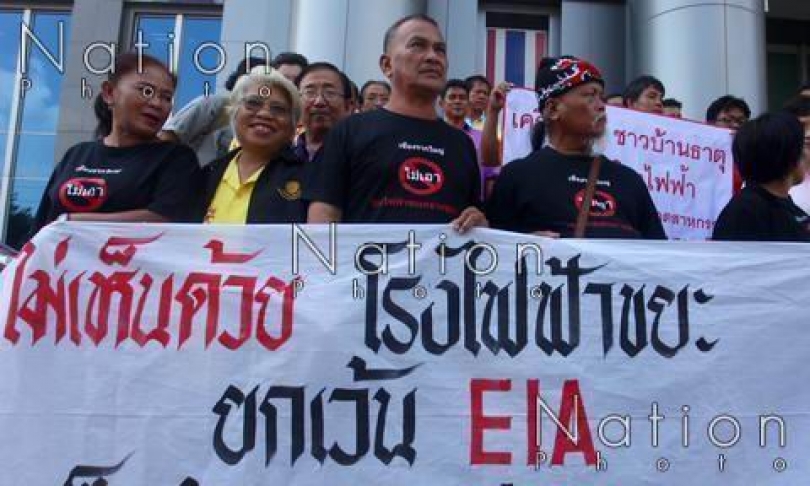Villagers fight a losing battle in 2015

Widespread land reclamation and environmental degradation enabled by govt programmes and complicit army authorities
THE YEAR 2015 has been another tough one for victims of environmental degradation and exploitation. Experts say people suffering because of development projects and government policies are subjected to human rights violations and repression.
As an example, since the beginning of the year, numerous reports told of communities shattered by the implementation of forest land reclamation policies. Entire rubber fields belonging to villagers who lived in the forest long before the establishment of national parks have been razed. Authorities have also demolished the houses of some villagers.
Prayong Doklamyai, from the People’s Movement for a Just Society, has campaigned for those affected by the government’s forest reclamation policy since the order was issued in 2014. He said the actions taken in 2015 against communities in the |forest were not always as bad as those in the previous year, but more than 180,000 rai (28,800 hectares) still had been reclaimed this year.
“Actually, the progress of the government to push this policy in 2015 was harder, because the goal of forest reclamation for the year was 600,000 rai,” Prayong said.
“According to the implementation of this policy, 1,030 people were arrested under the charge of forest encroachment. None of them could be identified by authorities as to whether they were capitalists or just poor farmers.”
He said the government’s goal to reclaim 40 per cent of forest within 10 years was unrealistic and the forestry master plan conflicted with people’s livelihoods and violated |communal rights.
He said government also had not taken serious measures to help poor and landless people. Progress to found a land bank has been slow; the communal-deeds office was closed leading to the suspension of |communal-land management problem-solving; and there was no discussion with local people prior to the establishment of new national parks.
Major issues this year involved not only land seizures, but also environmental degradation caused by pollution from gold mines, petroleum drilling and other development projects severely affecting the health and quality of life of nearby populations.
Chainarong Sretthachau, Maha Sarakham University lecturer, said many communities, especially in the North and East regions, suffered this year not only because of environmental problems, but because their voices were suppressed by big companies who owned the projects and the local authorities who supported them.
“Clear examples of public misery can be seen at a gold mine in Loei’s Wang Saphung district and a petroleum-drilling site in Khon Kaen’s Kranuan district where locals were seriously repressed by officers to protect the benefits of the mining and petroleum companies,” Chainarong said.
He gave the example of the site in Loei guarded by the Army since the National Council for Peace and Order (NCPO) came to power in 2014. Protests against the gold mine were restricted, people who opposed it were sued, and even academics found it difficult to gather information in the area.
“The voices of the people there were silenced by the company and authorities, both by force and legal power. But the health and environmental problems in the area still exist and are hazardous,” he said.
“Also at the petroleum drilling site near Ban Namun [in Kranuan], people there could not stop the drilling operation, which was guarded by the authorities.”
He said even at a gold mine in Phichit province, where there had not been intervention by the authorities despite media reports to the contrary, there had not been substantial help for local people affected by heavy metal contamination.
“The authorities often consider environment activism as linked with politics and think of it as a threat. Therefore, the suffering of the people will not end soon,” he added.
RELATED
